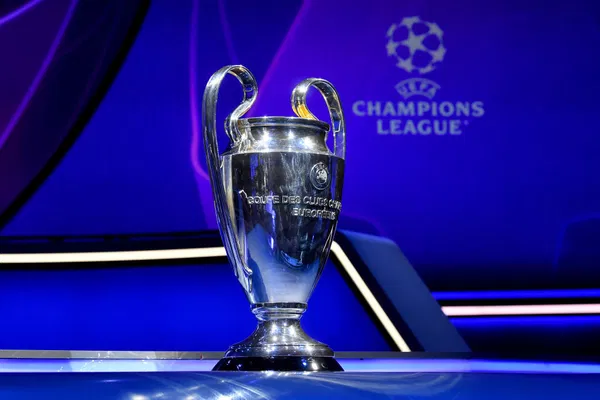
via Imago
Manchester City FC v FC Internazionale – UEFA Champions League Pep Guardiola, head coach of Manchester City, celebrates with the trophy during the award ceremony following the UEFA Champions League final football match between Manchester City FC and FC Internazionale. Istanbul Turkey Copyright: xNicolòxCampox

via Imago
Manchester City FC v FC Internazionale – UEFA Champions League Pep Guardiola, head coach of Manchester City, celebrates with the trophy during the award ceremony following the UEFA Champions League final football match between Manchester City FC and FC Internazionale. Istanbul Turkey Copyright: xNicolòxCampox
The UEFA Champions League for the 2024/25 campaign returned but with the biggest plot twist of all time. No one saw it coming but the 70th season of the European tournament witnessed a significant change in the format of the game. Though many are still confused about how the event would proceed further, the biggest concern of all remains the true intention behind making this unorthodox change in the competition. In short, does bringing this radical shift make sense? Well, this is a rather double-edged sword decision. Hence, to understand this better, we’ll consider the POV of both the UEFA and the teams and players that are participating in it.
Watch What’s Trending Now!
Why was the UEFA Champions League format changed?
Since 1992, this is the first time the iconic tournament has undergone such a metamorphosis. UEFA President Aleksander Ceferin addressed these significant changes “based on sporting merit.” He insisted that this “unanimous decision” comes from the agreement of the UEFA Executive Committee, with the European Club Association, European Leagues, and respective national associations.
ADVERTISEMENT
Article continues below this ad
Ceferin-led association further assured that this transformation, though is being made for this particular season, majorly preserves the future of this tournament “at every level and meets the evolving needs of all its stakeholders.” A perfect example to term these so-called ‘evolving needs’ is the European Super League. To remind you, elite clubs across Europe were ready to leave the Champions League in order to create their very own tournament, that would have safeguarded the interests of teams.

via Imago
GUENDOGAN Ilkay Kapitaen Team Manchester City bei der Siegerehrung mit Pokal und seiner Mannschaft rechts Trainer GUARDIOLA Josep UEFA Championsleague Finale 2023 in Istanbul Spiel Manchester City – Inter Mailand 1 : 0 am 10.Juni 2023 in Istanbul DFL REGULATIONS PROHIBIT ANY USE OF PHOTOGRAPHS as IMAGE SEQUENCES and/or QUASI-VIDEO *** GUENDOGAN Ilkay Kapitaen Team Manchester City at the award ceremony with trophy and his team on the right coach GUARDIOLA Josep UEFA Champions League Final 2023 in Istanbul match Manchester City Inter Milan 1 0 on 10 June 2023 in Istanbul DFL REGULATIONS PROHIBIT ANY USE OF PHOTOGRAPHS as IMAGE SEQUENCES and or QUASI VIDEO Copyright: xLacixPerenyix
Many top clubs like Barcelona, Real Madrid, and Juventus came together to send a proposal to tackle the existing instability in the European soccer’s economic model. The motives were further fueled by the global pandemic that disrupted the flow of almost everything in the beautiful game. Though clubs got a chance to revive themselves in the post-pandemic era, many clubs still remain adamant about bringing forward the proposition of the Super League.
ADVERTISEMENT
Article continues below this ad
UEFA had even warned the elite clubs over the consequences of joining the ESL over UCL. While the motion did fall in their favor, Caferin and Co. along with other apex European authorities guaranteed change to all the participating clubs. The change? You guessed it right, the new model that you all are witnessing for the 2024/25 season. UEFA had put in a couple of years to design this ‘Swiss method’ that benefits all the clubs.
Then, the changes were finally approved in May 2022. Interestingly, an official statement on the matter said, “The new landscape of UEFA club competitions will allow more teams and therefore more coaches and players to compete in more competitive games on the European stage.” The European League also reaffirmed that the new model prioritizes financial commitments.
While participating teams see it as a remarkable opportunity in all terms, players don’t feel the same. Liverpool goalie Alisson Becker shared his thoughts on the new model, insisting that while it’s ‘amazing‘ for the supporters to witness more enthralling fixtures, players won’t find it much amusing.
What’s your perspective on:
Is the new UEFA Champions League format a game-changer or just another money grab?
Have an interesting take?

“For us players as well, it is good that you are going to play against the best in Europe – and it is always a good idea to add some games to the calendar that is not busy… I am being ironic a little bit. Sometimes nobody asks the players what they think about adding more games so maybe our opinion does not matter.”
So once again, this unique arrangement that UEFA has gone for this season’s Champions League makes someone a scapegoat, this time the players, who may be forced to play more games in the already cramped calendar. Regardless, while the core motive of this has been understood, let’s take a look at how this model works.
How does the 2024/25 UCL format work?
The UEFA Champions League has adopted a new “Swiss model” format, expanding the competition from 32 to 36 teams. Instead of the usual group stage, all teams compete in one league, playing eight matches—four at home and four away—against eight different opponents. The teams are organized into four seeded pots of nine, with each team facing two clubs from each pot.

ADVERTISEMENT
Article continues below this ad
The top 8 teams automatically advance to the knockout stage, while teams ranked 9th to 16th will play two-legged playoffs to earn the remaining Round of 16 spots. Teams finishing 25th to 36th are eliminated after the league phase. No club will face teams from its domestic league, and each can play a maximum of two clubs from the same country. This new structure, however, does increase matchdays from 96 to 144, while the knockout stages remain the same.
It remains to be seen how the 2024/25 season turns out to be. If proved successful and feasible, then teams, players, and fans may have to adopt this new method in future editions, no matter what!
ADVERTISEMENT
ADVERTISEMENT
ADVERTISEMENT
ADVERTISEMENT



Is the new UEFA Champions League format a game-changer or just another money grab?